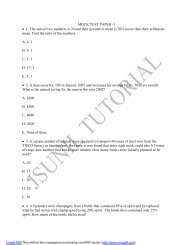- Page 4:
In the course of a short life of th
- Page 9 and 10:
eluctant to study English because o
- Page 12 and 13:
About Narendra's scholarship, Profe
- Page 14 and 15:
security and devoted to the contemp
- Page 16 and 17:
of various extreme spiritual discip
- Page 18 and 19:
Narendra, careless about his clothe
- Page 21 and 22:
Samaj he was critical of image wors
- Page 23 and 24:
Ramakrishna fell into a deep ecstas
- Page 25 and 26:
only as a dream. While strolling in
- Page 27 and 28:
accepting as the principle of moral
- Page 29 and 30:
Bitterly Naren said: 'Will you plea
- Page 31 and 32:
'Today,' the Master continued, 'is
- Page 33 and 34:
fire.Narendra always came to the Ma
- Page 35 and 36:
made by Naren's relatives for his m
- Page 37 and 38:
mind absorbed in deep thought. And
- Page 39 and 40:
devotees of God fall victims to men
- Page 41 and 42:
leader. It was an easy task for the
- Page 43 and 44:
told Sri Ramakrishna about it, but
- Page 45 and 46:
Hindu religious tradition. One of t
- Page 47 and 48:
AS A WANDERING MONKAmong the Master
- Page 49 and 50:
Divine Nectar!" And long after midn
- Page 51 and 52:
pilgrimage centre of Hardwar in the
- Page 53 and 54:
held him in high respect as a Divin
- Page 55 and 56:
materialistic conception of life en
- Page 57 and 58:
The degradation of the Indian masse
- Page 59 and 60:
lood, yet it reminded everyone of h
- Page 61 and 62:
And as regards death, what does it
- Page 63 and 64:
TRIP TO AMERICAAt Cape Comorin the
- Page 65 and 66:
in order to extricate itself from t
- Page 67 and 68:
fashion? A little learning has mudd
- Page 69 and 70:
celebrated song of Mirabai, and tea
- Page 71 and 72:
His thoughts always returned to Ind
- Page 73 and 74: Swami Vivekananda had no friends in
- Page 75 and 76: sympathy, while not yielding to it
- Page 77 and 78: esist that onslaught you are indeed
- Page 79 and 80: of other people. America discovered
- Page 81 and 82: from Christ? Christ would have deni
- Page 83 and 84: landed on the barren cost of Cape C
- Page 85 and 86: show that Whitman was directly infl
- Page 87 and 88: of India. This accounts for the spo
- Page 89 and 90: enunciation, and truth as taught by
- Page 91 and 92: to see the women of this country. T
- Page 93 and 94: from door to door of the so-called
- Page 95 and 96: Mother Earth, and I enjoyed every b
- Page 97 and 98: He began to instruct several chosen
- Page 99 and 100: staff of a prominent New York newsp
- Page 101 and 102: one day expressed the desire to tal
- Page 103 and 104: exclaimed, 'What have we ever done
- Page 105 and 106: his arm, in the fashion of the negr
- Page 107 and 108: mental depression. The Swami, who d
- Page 109 and 110: daughters were named Mary and Harri
- Page 111 and 112: EXPERIENCES IN THE WESTFor some tim
- Page 113 and 114: The metropolis of the British Empir
- Page 115 and 116: Kripananda, Abhayananda, and Miss W
- Page 117 and 118: experience.'On March 25, 1896, he d
- Page 119 and 120: Another was the story of a 'darky'
- Page 121 and 122: and with divine prodigality.' The S
- Page 123: Coming out of one of the Swami's le
- Page 127 and 128: touch of whose waters all distincti
- Page 129 and 130: Line, sailing from Naples for Ceylo
- Page 131 and 132: The Swami felt that the finger of G
- Page 133 and 134: my playful darling. I am His playfe
- Page 135 and 136: man, like a rishi of India, who sai
- Page 137 and 138: simple, strong, new and fresh as th
- Page 139 and 140: Since the day of his success at the
- Page 141 and 142: Iyengar, where arrangements had bee
- Page 143 and 144: forms the centre, the keynote of th
- Page 145 and 146: invigorating. Give up these weakeni
- Page 147 and 148: their respects or to hear his expos
- Page 149 and 150: The brother disciples, who respecte
- Page 151 and 152: starvation of the masses, the humil
- Page 153 and 154: and again against preaching, excess
- Page 155 and 156: From this incident one sees how Viv
- Page 157 and 158: IN NORTHERN INDIAFrom May 1897 to t
- Page 159 and 160: Next the Swami travelled to Dehra-D
- Page 161 and 162: spend hours with the students in me
- Page 163 and 164: superstition, and the slavery that
- Page 165 and 166: eligious service, the shrine used f
- Page 167 and 168: Before the Swami left Almora, he ar
- Page 169 and 170: have found the way. Enter all of yo
- Page 171 and 172: of Her destructive side. But is the
- Page 173 and 174: enevolent God ordered it? You will
- Page 175 and 176:
Sri Ramakrishna's consort, 'prayed
- Page 177 and 178:
of the Swami's own disciples were s
- Page 179 and 180:
Swami thundered: 'Why? What is the
- Page 181 and 182:
SECOND VISIT TO THE WESTOn December
- Page 183 and 184:
'But anyone will be great in a grea
- Page 185 and 186:
Los Angeles. As she was leaving for
- Page 187 and 188:
Mills, the minister of the First Un
- Page 189 and 190:
flying, carried, by its original im
- Page 191 and 192:
I wrote to him only to tell him his
- Page 193 and 194:
the desire for death.' When asked t
- Page 195 and 196:
Constantinople after passing throug
- Page 197 and 198:
During his trip through Eastern Eur
- Page 199 and 200:
The Advaita Ashrama at Mayavati had
- Page 201 and 202:
Concerning the impressions of his t
- Page 203 and 204:
future work.Though his body was wea
- Page 205 and 206:
Okakura earnestly requested the Swa
- Page 207 and 208:
ackbone of the nation, whose labour
- Page 209 and 210:
aired and properly taken care of. H
- Page 211 and 212:
To his beloved disciple Nivedita he
- Page 213 and 214:
meal. To quote the Sister's words:E
- Page 215 and 216:
The brother disciples thought that
- Page 217 and 218:
A SHORT LIFEOFSWAMI VIVEKANANDASWAM
- Page 219 and 220:
SWAMI VIVEKANANDA 3PUBLISHER’S NO
- Page 221 and 222:
SWAMI VIVEKANANDA 5courage to a dro
- Page 223 and 224:
SWAMI VIVEKANANDA 7A SHORT LIFE OFS
- Page 225 and 226:
SWAMI VIVEKANANDA 9to tell later ho
- Page 227 and 228:
SWAMI VIVEKANANDA 11he flourished a
- Page 229 and 230:
SWAMI VIVEKANANDA 13to Naren. Teach
- Page 231 and 232:
SWAMI VIVEKANANDA 15grew older, a d
- Page 233 and 234:
SWAMI VIVEKANANDA 17the subject, I
- Page 235 and 236:
SWAMI VIVEKANANDA 19youthful theism
- Page 237 and 238:
SWAMI VIVEKANANDA 21was startled by
- Page 239 and 240:
SWAMI VIVEKANANDA 23Ramakrishna bec
- Page 241 and 242:
SWAMI VIVEKANANDA 25at home!? He la
- Page 243 and 244:
SWAMI VIVEKANANDA 27But Narendra Na
- Page 245 and 246:
SWAMI VIVEKANANDA 29innermost secre
- Page 247 and 248:
SWAMI VIVEKANANDA 31spiritually ill
- Page 249 and 250:
SWAMI VIVEKANANDA 33fool, the rich
- Page 251 and 252:
SWAMI VIVEKANANDA 35these young boy
- Page 253 and 254:
SWAMI VIVEKANANDA 37the delight of
- Page 255 and 256:
SWAMI VIVEKANANDA 39Himalayas to ac
- Page 257 and 258:
SWAMI VIVEKANANDA 41The Dewan answe
- Page 259 and 260:
SWAMI VIVEKANANDA 43West, the Mahar
- Page 261 and 262:
SWAMI VIVEKANANDA 45which was his t
- Page 263 and 264:
SWAMI VIVEKANANDA 47To effect this,
- Page 265 and 266:
SWAMI VIVEKANANDA 49acceptance, and
- Page 267 and 268:
SWAMI VIVEKANANDA 51even the time f
- Page 269 and 270:
SWAMI VIVEKANANDA 53told her his di
- Page 271 and 272:
SWAMI VIVEKANANDA 55opening words,
- Page 273 and 274:
SWAMI VIVEKANANDA 57in aiding human
- Page 275 and 276:
SWAMI VIVEKANANDA 59and lodged in a
- Page 277 and 278:
SWAMI VIVEKANANDA 61previous visits
- Page 279 and 280:
SWAMI VIVEKANANDA 63The place was i
- Page 281 and 282:
SWAMI VIVEKANANDA 65part of Februar
- Page 283 and 284:
SWAMI VIVEKANANDA 67was at the whit
- Page 285 and 286:
SWAMI VIVEKANANDA 69siastic and res
- Page 287 and 288:
SWAMI VIVEKANANDA 71Ramakrishna: Hi
- Page 289 and 290:
SWAMI VIVEKANANDA 73there; and he b
- Page 291 and 292:
SWAMI VIVEKANANDA 75the Indian publ
- Page 293 and 294:
SWAMI VIVEKANANDA 77love of the peo
- Page 295 and 296:
SWAMI VIVEKANANDA 79yourself, procl
- Page 297 and 298:
SWAMI VIVEKANANDA 81all around us.?
- Page 299 and 300:
SWAMI VIVEKANANDA 83the devotees of
- Page 301 and 302:
SWAMI VIVEKANANDA 85the Vedanta in
- Page 303 and 304:
SWAMI VIVEKANANDA 87their lives to
- Page 305 and 306:
SWAMI VIVEKANANDA 89strength, and s
- Page 307 and 308:
SWAMI VIVEKANANDA 91came to him. So
- Page 309 and 310:
SWAMI VIVEKANANDA 93America for thi
- Page 311 and 312:
SWAMI VIVEKANANDA 95there was alway
- Page 313 and 314:
SWAMI VIVEKANANDA 97all on the surf
- Page 315 and 316:
SWAMI VIVEKANANDA 99‘Hansi’ the
- Page 317 and 318:
SWAMI VIVEKANANDA 101means wherewit
- Page 319 and 320:
SWAMI VIVEKANANDA 103THE PASSINGThe
- Page 321 and 322:
SWAMI VIVEKANANDA 105all was calm a
- Page 323 and 324:
SWAMI VIVEKANANDA 107He is an athei
- Page 325 and 326:
SWAMI VIVEKANANDA 109God—think of
- Page 327 and 328:
SWAMI VIVEKANANDA 111— ( o ) —T
- Page 329 and 330:
SWAMI VIVEKANANDA 113that of the wo
- Page 331:
SWAMI VIVEKANANDA 115NOTES1The Swam




